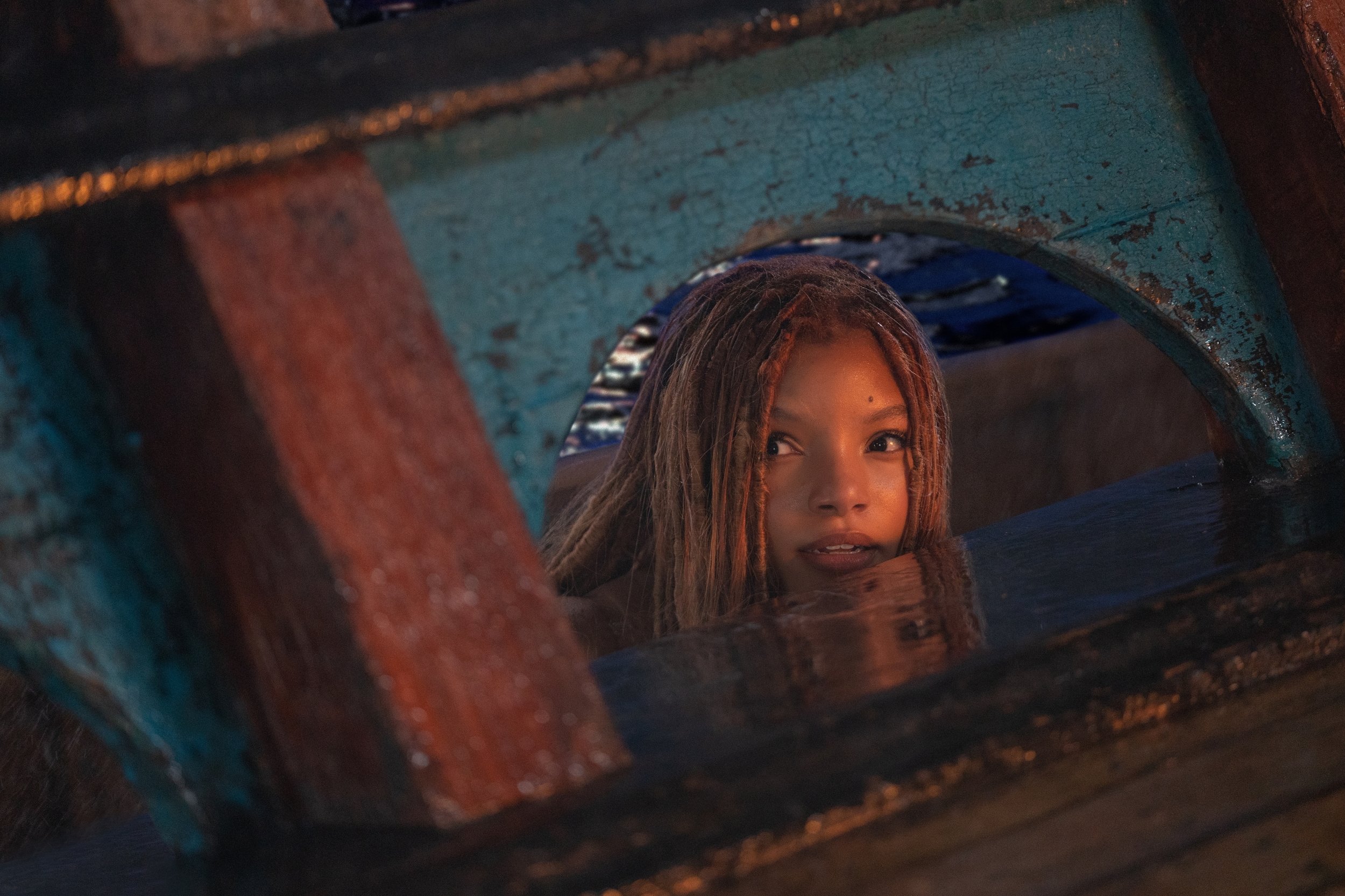Reimagined and Improved: The Little Mermaid review
By Sioph LealThe well-loved tale of Ariel (Halle Bailey), a charming and courageous young mermaid with a passion for exploration, comes to life in the live-action adaptation of The Little Mermaid. She is the rebellious and youngest daughter of King Triton (Javier Bardem), who yearns to learn more about the world above the water. Also longing for adventure is Eric (Jonah Hauer-King), who washed ashore twenty-one years ago, surviving a shipwreck, and was adopted into the royal family. Breaking rules and visiting the surface, Ariel sees Eric and wishes for life on the shore. In exchange for a chance to see life on dry land, she strikes a pact with the wicked sea witch Ursula (Melissa McCarthy), endangering both her life and her father's throne.
‘But a mermaid has no tears, and therefore she suffers so much more," appears against a backdrop of a storm-ridden sea as sailors hunt down a mermaid, an omen for how much the titular character will suffer in the pursuit of her dreams. The transition from the above world to the sea is done through the journey of Eric accidentally dropping a telescope in the sea, only for Ariel to find it and take us through her world to her grotto. A strong juxtaposition between how the sea is for humans and the ocean floor shows immediately, contrasting the two worlds.
Everyone knows the story of the original Little Mermaid and the themes: a young girl wanting to experience something new and be with the man she loves despite her family's lack of understanding. Eric mirrors this with his own desires. Although Ariel longs for life on the shore, Eric longs to explore uncharted waters, and with a deeper backstory and connection to the sea, the two leads seem fated to be together.
The water itself is its own character. It’s calm and serene for the merfolk, in perfect balance with everything while being bright and beautiful, but for humans and the above world, the water is dark, unforgiving, and storm-ridden. It’s relentless in its punishment of the world above. Instantly seeing the juxtaposed worlds and knowing Ariel and Eric's desire to experience them gives the real sense of adventure and wonder that made the original a beloved classic.
Every adaptation has changes and tweaks, and The Little Mermaid utilizes the changes to deepen the story and bring more life to the characters. Ariel falls in love with Eric before she sees him, hearing him sing with his crew with the infectious Fathoms Below. He’s a man of his people, and he laments to Grimsby (Art Malik) how he longs to be of use to his people through his voyages but how his mother does not understand. That hits home with Ariel, and they have that instant connection. They share a desire to explore other worlds but are held back. Subtle changes help elevate the story, making it more character-driven. Unlike the animated movie, Ariel does not need a lot of help from her sea creature friends. She is more independent, which is a refreshing take. The love of a prince isn’t Ariel’s main goal in the movie. Bailey’s Ariel has an adventurous heart, craving to see what the above world has to offer, while Hauer-King’s Eric leads with compassion while yearning to explore the world outside his island. Ariel's focus is slightly shifted in a confrontation with her father about going to the surface. Triton refuses to listen to Ariel and tells her she can never leave. Gone is Ariel’s confession to Triton about loving Eric; instead, she is devastated that he refuses to listen to her and let her be her own fish.
The relationship between Ariel and Eric feels more grounded and sets up Ariel wanting to be part of the land world with Eric, not just being with Eric. There’s a sweet moment between the two as Eric shows her his kingdom, but Ariel is so besotted with the human world that she leaves Eric to explore. He is not her priority or focus, but a nice addition to it. Her curiosity about the world and wonder at it breaks through his obsession with finding the woman who saved him to connect with her. The first thing Ariel learns about Eric is his kind heart, which is also what causes her to start liking him. While she observes Eric taking part in the fun of his fellow sailors, she also witnesses him run even deeper into a flaming ship to save Max, which would make anyone fall in love with such a noble prince. Ariel and Eric are connected even during Max's rescue missions, when she assists Max in getting to a rescue boat while Eric helps the dog escape the burning boat. Even though it only lasts for a second, it quietly demonstrates how their union is predestined.
When it comes to Kiss the Girl, Sebastian (Daveed Diggs) shifts his focus to secure Ariel's kiss after Ursula’s spell makes it impossible for Ariel to remember that vital part. Instead of taking the lead, Sebastian works in harmony with Scuttle (Awkwafina) and Flounder (Jacob Tremblay) to complete Ariel’s mission. Kiss the Girl is a beautiful moment between all the characters because the movie took care to expand Ariel and Eric in a way that feels organic and respectful to the original.
In a delightfully wicked performance, Ursula is a highlight of the movie. Despite a slightly rocky opening that feels randomly placed, McCarthy looks like she is having the time of her life in the role. She is evil, fabulous, and tricky, but close to sheer perfection. As dramatic as she is conniving, Ursula’s resentment for her brother and thirst for revenge seeps through every second she is on screen. She is a stark contrast to the sweet and airy Ariel, but they both have a fierceness on screen that comes to a head when, as Vanessa (Jessica Alexander), they have a very public confrontation. Contrasted to the original, the animals and sea creatures fought Vanessa and Ursula, but Ariel has agency and independence in this version in every way and fights her on her own. Alexander’s performance as Vanessa was brief, but it will be memorable given how flawlessly Alexander captures her duplicitous and manic side.
From the moment audiences are plunged below the ocean’s surface, it almost feels as if you are diving into the deep blue yourself. It’s an immersive experience as you see the sea through the eyes of Ariel, and the same method is used to show Ariel experiencing the above world. Audiences expressed concerns about the vibrancy of the movie. When the teaser was first released, some commented on how dark the environment looked. After watching The Little Mermaid, allow me to reassure those that the movie is vibrant and colorful, perhaps more so than the animated version. ‘Under the Sea’ is the most colorful and fun song, as it explores the sea in more depth and fun than the animated movie. While there are darker scenes, such as Ursula’s dwelling, having her tentacles light up with a luminous blue and her different coloured potions illuminate and contrast to the darkness in a subtle way
Casting a live-action Ariel is no easy job. They must be vocally strong, and an actor must be able to carry a performance with facial and body language. Disney found the perfect Ariel with Halle Bailey, who instantly shows she is the perfect choice. Bailey brings a new layer of vulnerability and maturity to Ariel, who is frustrated that her father doesn’t listen to her. This Ariel is no longer the lovesick teenager we all fell in love with during the animation, but she is independent and resilient.
Part of the magic of The Little Mermaid is the music. Vocally, no one can meet Halle’s level, who brings innocence and power to Ariel both vocally and performatively. Ariel gets two new songs in this version: For the First Time, which is mostly sung internally as she experiences everything on shore. It is a testament to Halle’s capabilities as an actor to carry all the nuanced emotion in a single look. She can switch from excited and nervous straight to gut-wrenching disappointment in a way that makes you feel the impact of rejection as she feels it. You'll cry listening to Part of Your World and its second reprise. The second reprise, performed internally once more, vocally and physically, reveals Ariel's anguish in a way that no other performer could have. The original is a potent ballad for Ariel that will even bring tears to the eyes of adults.
While this is an almost perfect retelling, there are a small number of things that didn’t quite fit into the style of the movie. Scuttlebutt is a distraction from an otherwise great soundtrack and is more of an annoyance than it is a song. It breaks apart the storytelling and does not match the movie’s style in any way. It is distinctive of Lin-Manuel Miranda, but as fantastic as he is, this song does not belong in The Little Mermaid and could have made way for a new song that would match better or be excluded altogether.
Ursula's screen time is heavily dominated by monologues from the beginning. This was effective in the animated version, but it doesn't quite work in the live-action retelling. Even so, it doesn't detract from McCarthy's portrayal of the evil sea witch. If Flotsam and Jetsom had been given a few lines, it might have made all the difference. Other than that, Ursula is still a delightful villain who is such a treat to see brought to life by McCarthy.
The Little Mermaid has been expertly recreated by Rob Marshall, and this version is one that can be rewatched and enjoyed just as much as the first time. It is more vibrant and wonder-filled than the original, and it is just as amazing. It also has more fun and variety. Halle's voice, which shines no matter the song or scenario, is undoubtedly the highlight. She possesses a beautiful, natural warmth, and her Ariel has an airy, wonderful voice that makes Ariel her own. There is no one better suited to play Ariel, and Halle demonstrates her incredible talent in every single scene. Ariel has more to offer and more to say in this version. You'll be enthralled by everything and left wanting more by the abilities and feelings on display.





